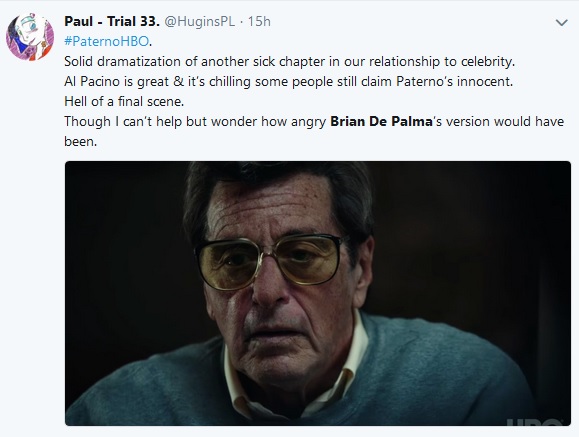FRAMING DEVICE OF PACINO FLASHBACKING WHILE HELPLESS IN MRI SCAN RECALLS THAT OF 'CARILTO'S WAY'

I haven't seen it yet, but reviews of HBO's Paterno mention that the biopic uses a framing device in which Al Pacino (as Joe Paterno) is, as AV/TV Club's Ignatiy Vishnevetsky puts it, "lying helplessly in the narrow tube of the machine... watching as scenes are projected on its cylindrical wall." Of course, the first thing I think about when I read this is Pacino's Carlito, lying helplessly on a gurney at the beginning and end of Brian De Palma's Carlito's Way, gazing at the ad for "Paradise" as he flashes back to how he got there. De Palma, of course, was the original director for the Paterno project at HBO, when it was still called Happy Valley. David McKenna was the writer at the time, and one wonders if they had utilized this framing device in the script from the start, from a possible suggestion by De Palma and Pacino, looking back at Carlito's Way.
In any case, at least a couple of the reviews wish that De Palma had remained the director of the project, which was eventually made under the direction of Barry Levinson. Here's an excerpt from Vishnevetsky's review:
In other words, this isn’t what one would call an elegantly coordinated narrative. Making a secondary protagonist out of Sara Ganim (Riley Keough), who won a Pulitzer for her work on the charges against Sandusky and Penn State for The Patriot-News of Harrisburg, Pennsylvania, might seem like a no-brainer straight out of Screenwriting 101. But Debora Cahn and John C. Richards’ amateurish script opts to just have random characters shout exposition at the journalist (“Joe Pa made an ethos in this whole place!”), as though she were having the scandal reported to her instead of reporting on it. Bewilderingly, the question of whether Paterno knew about accusations that Sandusky was molesting young boys (he did, since at least the late 1990s) and helped sweep said accusations under the rug (of course he did) are placed at the center of the film, when it’s clear that the more interesting question is “Why?” A drama about sexual abuse and institutional corruption might seem topical, but all Paterno offers its audience is a chance to re-experience the cable news cycle of yesteryear.Writing aside, Pacino’s Paterno is an intriguingly slumpy, sluggish, distracted figure. Having also played the title role in HBO’s David Mamet-directed Phil Spector, the actor is as much of an old hand at these things as Levinson, and he avoids bluster, instead stretching the raspy and burpy notes in his voice, playing the disgraced coach as a man confused by his own downfall. In fact, there are enough quality performances in Paterno—most notably from Greg Grunberg as Paterno’s son, Scott, and from Kathy Baker, who has a smaller role as the coach’s wife, Sue—to make one wish there were a better film to support them. One can’t help but play shoulda-woulda-coulda with the fact that Paterno began life as a reunion project for Pacino and his Scarface and Carlito’s Way director, Brian De Palma—by most accounts a very different film that would have focused on the relationship between Paterno and Sandusky. At the time, John Carroll Lynch was cast as the latter; in Paterno, the character is basically a non-speaking role, played by a jobbing actor named Jim Johnson, whose IMDB page offers a Tobias Fünke-esque collection of headshots.
To say that Levinson lacks formal chops of someone like De Palma would be an understatement. Enlisting the Hungarian cinematographer Marcell Rév (White God), he directs in the style that has increasingly come to pass for “creativity” in our age of prestige TV—that is, randomly placed wide-angle lenses and gelatinously shallow depth-of-field that presumably symbolizes the myopia of the characters, but mostly looks like the work of a film student who just got their hands on a T1.3 aperture for the first time. These entry-level distancing effects (see also: the MRI machine) never succeed in hiding or overcoming Paterno’s flimsiness as drama, its tendency to pass off the obvious as revelation. Is there a dark side to every success story? Probably. But the only cogent insight about society at large to emerge from HBO’s ongoing project to turn every fall from grace that makes the news for more than a week into a TV movie is the fact that there remains no shortage of material.
And here's an excerpt from the review by Variety's Mekeisha Madden Toby:
Watching HBO Films’ latest snatched-from-the-headlines project, “Paterno,” one can’t help but wonder how different it might have been had Brian De Palma directed it.He’s had an advantageous working relationship with star Al Pacino on both “Scarface” and “Carlito’s Way.” In his hands, the film could have been a “King Lear”-level tragedy about a sports legend whose singular focus led to his downfall.
Instead what viewers get is director Barry Levinson’s well-intended but paroxysmal journey into legendary college football coach Joe Paterno’s fall from grace, fired by Penn State for his role in the Jerry Sandusky abuse scandal.
Unsure if he wants to focus more on Paterno or newspaper journalist Sara Ganim — the reporter who broke the Sandusky story — Levinson constantly switches his gaze from one to the other. Ganim’s role as a consultant on the film may have mucked up the process even more. The end result is a film that clumsily tries to sympathize with Paterno instead of the young boys he chose to ignore until it was too late.
Updated: Monday, April 9, 2018 3:18 AM CDT
Post Comment | Permalink | Share This Post



